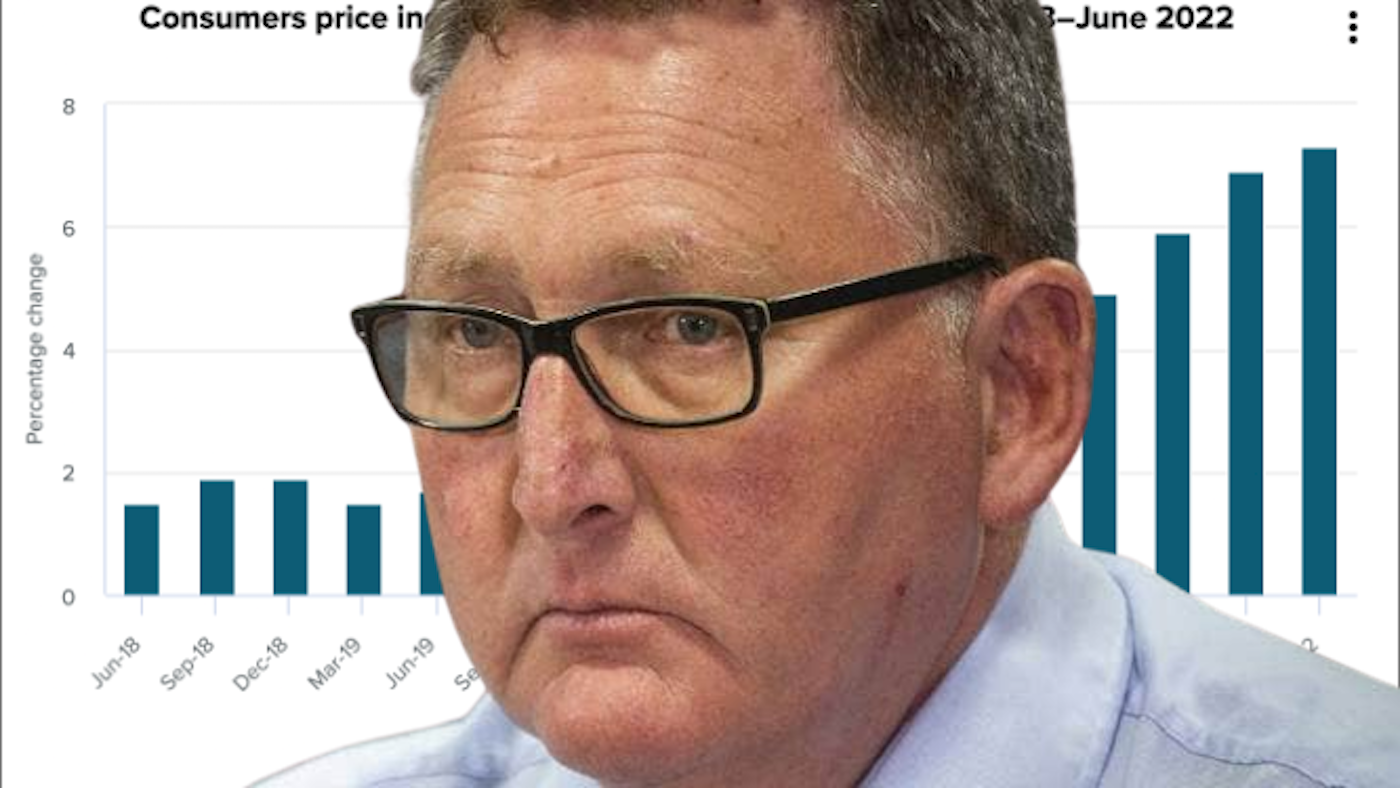The Reserve Bank has a statutory requirement to keep inflation under control and to keep it within a band of 0-2%. For five quarters in a row, inflation has exceeded the statutory limits, yet Adrian Orr still remains the Reserve bank Governor. Yesterday inflation hit 7.3%, the highest in 32 years. Why isn’t he grovelling on his knees to save his job, and why isn’t Grant Robertson making unsympathetic noises regarding his future?

Inflation in New Zealand has hit a steeper-than-forecast 7.3%, its highest level in three decades, with households facing hefty jumps in food, petrol and housing costs.
Stats NZ has released its quarterly consumers price index for the three months leading up to June. Inflation rose from 6.9% in March to 7.3%, with food up 1.3% and 2.3% rises in transport as well as housing and household utilities.
Major banks, including ANZ and the Reserve Bank had predicted inflation would come in at 7% or 7.1%. Infometrics forecast the 7.3% rate, which is the highest since June 1990.
The Guardian
The highest in 32 years: if that isn’t the mark of failure of this government and the Reserve Bank Governor then I don’t know what is.
Housing and household utilities were the top contributors to both quarterly and annual inflation, Stats NZ reported, with the main drivers being an 18% jump in construction costs in the June 2022 quarter compared with same period last year, and rent increases.
“Supply-chain issues, labour costs, and higher demand have continued to push up the cost of building a new house,” said Jason Attewell, Stat’s NZ general manager.
The Guardian
Let’s think about that for a minute.
Hmm…this government was elected to solve a housing crisis, they’ve also hammered landlords claiming that this was going to make life easier for tenants. But what have we got as a result of these ‘game-changing’ policies in housing?
We’ve got rocketing construction costs, leading to increased prices across the board, and massive rent increases. It seems that the socialists’ wonky thinking, that landlords wouldn’t pass on massive compliance costs and massive capital expenditure, has just kicked them in the balls.
The next largest contributor was transport, with an annual increase of 32% to petrol prices and a whopping 74% increase to diesel prices.
The rise in transport was partly offset by falling prices for road passenger transport, international air fares, rail passenger transport, secondhand cars, and other private transport services, which includes road user charges, Stats NZ said.
“Half-price bus and train fares came into effect from 1 April and prices for road user charges were reduced from 21 April. These price falls were reflected this quarter,” Attewell said.
Those measures could continue to help offset some transport costs, after the government announced on Sunday it would extend half-price fares and reductions in fuel excise duties and road user charges until 2023.
The reductions, initially designed to last three months, were announced in March to help combat cost-of-living pressures as global oil prices soared.
Who makes the most out of rising fuel prices? That’s right the government, who reap a massive windfall from GST alone. And riddle me this, how wise was it to shut Marsden Point and our ability to process our own fuels when we are now competing on the open market for diesel?
On top of that crude prices are about the same as they were 20 years ago, but petrol and diesel weren’t $3 a litre back then. Something stinks here, and maybe the fuel crisis is actually designed that way by the socialists, on purpose.

Food prices continue to rise, up 6.5% annually, and up 1.3% from the previous quarter.
Non-tradable inflation, which measures goods and services that do not face foreign competition and is considered a measure of domestic inflation, hit a record high of 6.3%.
The Guardian
Food prices are tied to fuel prices. No amount of electric tractors, trucks and vans, is going to alleviate the huge cost increases that are now being experienced on fuel.
The government’s pathetic confutation of excise discounts is actually not stemming inflation in the remotest. Plus when they pile them back on there will be an immediate increase in prices again, further exacerbating the inflation.
Given that for five quarters in a row, the Reserve Bank has breached its statutory obligations and is now so far behind the metaphorical eight-ball in combatting inflation, why does Adrian Orr still have his job? Why do the members of the Reserve Bank board still have their jobs?
The All Blacks lose two tests in a row and a test series, and there are immediate calls for the sacking of the coach. That’s just a game of footy, but the calls are there. Adrian Orr is the coach of the economy and he’s been losing games for more than a year. Why is he still there?
The government is the equivalent of the All Blacks selection panel, and if they won’t sack Orr and his board, then surely the buck has to stop with the Minister of Finance. Why aren’t there calls for his sacking too?
The responsibility for the ongoing damage to our economy rests with Grant Robertson and Adrian Orr. Surely after missing their targets so comprehensively, by the proverbial country mile in the latest quarter, there is a case for the removal of both, or a private prosecution to at least hold someone to account for the demonstrable failure.
Please share this article so others can discover The BFD.

